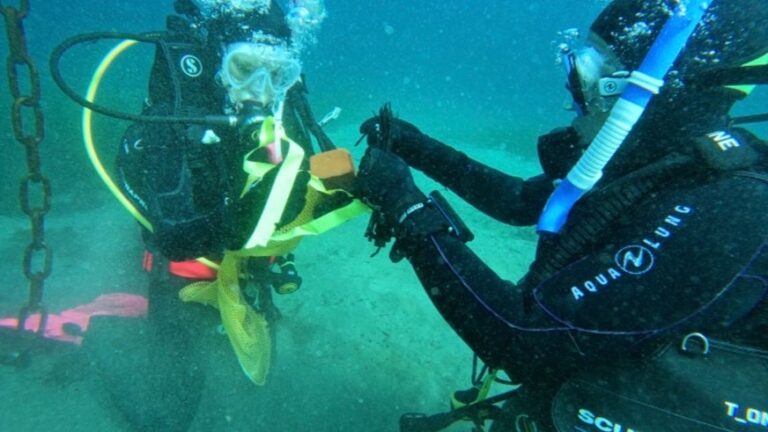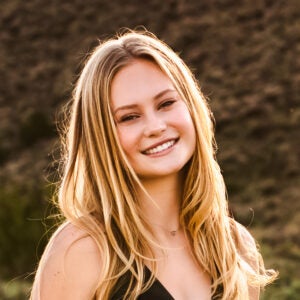
For environmental science major, scientific diving unlocks new ambitions
One of Emerson Damiano’s earliest memories is about biodiversity. In second grade, her teacher asked students to write a speech about a topic that was important to them. Damiano chose species extinction.

She remembers that assignment as the beginning of her environmental journey. In elementary school, she founded an altruism club focused on environmental issues. She created a “Keep It Green” club in middle school, focused on recycling, composting, and the environmental impact of the meat industry. And in high school, she helped her science teacher with research on corals. She also interned with the Colorado chapter of the Inland Ocean Coalition, which advocated for ocean-friendly policies like bans on plastic bags and styrofoam.
“That was when I realized I wanted to study the ocean, especially government policies that affect the ocean,” Damiano says. “I started researching colleges and read all about the Wrigley Institute. I thought it was so cool that USC had its own campus on Catalina Island for environmental research.”
Damiano entered USC on a pre-law track, intending to become an environmental lawyer. But her first course in the Environmental Studies (ENST) Program changed her mind. David Ginsburg, her ENST 100 instructor, encouraged her to take the program’s scientific diving course. Damiano obtained her certification during finals week of her first year at USC.
“I’ve been kind of non-stop getting certifications and diving ever since. I’ve been trying to do everything I can to involve myself in policy, but from the outside. I really found a passion for field research through scientific diving,” Damiano says.
She switched to the Progressive Degree Program in environmental science and will graduate in May with her combined B.A./M.A. in the subject, plus a B.A. in French. The ceremony will cap off a packed four years of coursework, internships, research projects, and life-changing experiences.
“Having actual conversations with people and getting to know them is the best way to make change.”
At USC, Damiano has worked with nonprofits Heal the Bay and the Palos Verdes Peninsula Land Conservancy. She also completed three years of research projects with Ginsburg, studying fish populations off the coast of Catalina and the impacts of climate change on ocean microbes.
All these experiences have made an impact on her life, Damiano says, but her internship with ocean-conservation nonprofit Oceana has perhaps been the most memorable. Damiano connected with Oceana while serving as a student ambassador for the Tyler Prize, a USC-administered award that recognizes the lifetime achievements of environmental scientists and advocates.
At Oceana, Damiano worked with staff scientists Geoff Shester and Caitlynn Birch to create a report on ways to monitor bycatch in Southern California fisheries. Bycatch are the unwanted fish and other marine animals accidentally caught during commercial fishing for other species. Animals caught as bycatch are often killed or injured in the process, and sometimes are on threatened- or endangered-species lists. For these reasons, bycatch monitoring is important for effective fisheries management.

“The goal was to establish Oceana as a credible source [of information] for government bodies that manage fisheries. The challenge we faced is that there was a lack of data on the impacts of Southern California fisheries on the ecosystem,” Shester says. “We wanted Emerson to identify information that would help policymakers and other non-scientists get up to speed quickly on the issue.”
Damiano learned a lot as she put together the report. However, she says the most memorable lessons came from presenting it to stakeholders. At a community meeting, she came face-to-face with fishers who opposed monitoring because they were afraid it would harm their livelihoods. That was an issue Damiano hadn’t considered.
“In one of my environmental studies seminars, Professor [Vicky] Petryshyn said, ‘Being an environmentalist is a privilege. For so many people, just putting food on the table has to be their primary focus.’ I’ve been in this environmental bubble all my life. I didn’t really understand what she meant until that moment,” Damiano says.
The experience increased her empathy for people who might not agree with her. It also helped her appreciate how environmental policies can impact people’s everyday lives. “I learned that having actual conversations with people and getting to know them is the best way to make change,” she says.
Damiano intends to take that expanded perspective with her as she leaves USC. She plans to work for a year in the Los Angeles area before entering graduate school for a Ph.D. in environmental science. Her ultimate goal is to use scientific research as a tool for creating effective environmental policies.
“The Environmental Studies Program completely shifted the route I expected to take with my life,” Damiano says. “I think that’s entirely because of my experience out on Catalina Island, all my experience in the water, and my professors who helped me realize how I could have the biggest impact.”
Learn more about the Environmental Studies Program >>
Learn more about scientific diving at the Wrigley Institute >>